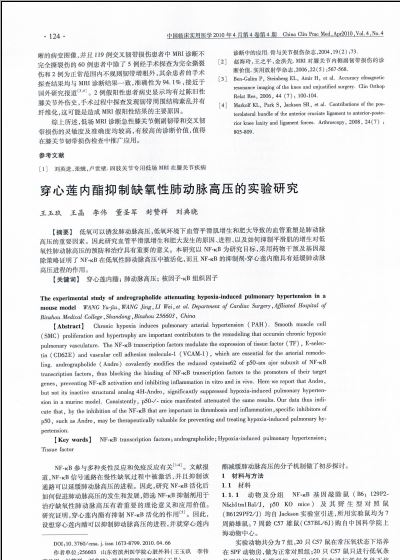穿心莲内酯抑制缺氧性肺动脉高压的实验研究(1)
 |
| 第1页 |
参见附件(2987KB,4页)。
【摘要】 低氧可以诱发肺动脉高压,低氧环境下血管平滑肌增生和肥大导致的血管重塑是肺动脉高压的重要因素。因此研究血管平滑肌增生和肥大发生的原因、进程、以及如何抑制平滑肌的增生对低氧性肺动脉高压的预防和治疗具有重要的意义。本研究以NF-κB为研究目标,采用药物干预及基因敲除策略证明了NF-κB在低氧性肺动脉高压中被活化,而且NF-κB的抑制剂-穿心莲内酯具有延缓肺动脉高压进程的作用。
【关键词】 穿心莲内酯; 肺动脉高压;核因子-κB 组织因子
The experimental study of andrographolide attenuating hypoxia-induced pulmonary hypertension in a mouse model
WANG Yu-jiu,WANG Jing,LI Wei,et al.
Department of Cardiac Surgery,Affliated Hospital of Binzhou Medical College,Shandong,Binzhou 256603, China
【Abstract】Chronic hypoxia induces pulmonary arterial hypertension (PAH). Smooth muscle cell (SMC) proliferation and hypertrophy are important contributors to the remodeling that occursin chronic hypoxic pulmonary vasculature. The NF-κB transcription factors modulate the expression of tissue factor (TF), E-selectin (CD62E) and vascular cell adhesion molecule-1 (VCAM-1), which are essential for the arterialremodeling. andrographolide (Andro) covalently modifies the reduced cysteine62 of p50-am ajor subunit of NF-κB transcription factors, thus blocking the binding of NF-κB transcription factors to the promoters of their target genes, preventing NF-κB activation and inhibiting inflammation in vitro and in vivo. Here we report that Andro, but not its inactive structural analog 4H-Andro, significantly suppressed hypoxia-induced pulmonary hypertensionin a murine model. Consistently, p50-/- mice manifested attenuated the same results.Our data thus indicate that, by the inhibition of the NF-κB that are important in thrombosis and inflammation,specific inhibitors of p50, such as Andro, may be therapeutically valuable for preventing and treating hypoxia-induced pulmonary hypertension.
【Key words】 NF-κB transcription factors;andrographolide;Hypoxia-induced pulmonary hypertension;Tissue factor
NF-κB参与多种炎性反应和免疫反应有关[1-4]。文献报道,NF-κB信号通路在慢性缺氧过程中被激活,并且抑制该通路可以延缓肺动脉高压的进程。因此,研究NF-κB活化后如何促进肺动脉高压的发生和发展,筛选NF-κB抑制剂用于治疗缺氧性肺动脉高压有着重要的理论意义和应用价值。研究证明,穿心莲内酯有抑制NF-κB活化的作用[5]。因此,设想穿心莲内酯可以抑制肺动脉高压的进程,并就穿心莲内酯减缓肺动脉高压的分子机制做了初步探讨。
1 材料与方法 ......
您现在查看是摘要介绍页,详见PDF附件(2987KB,4页)。